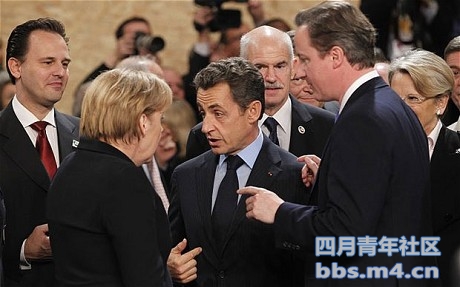|
|
【原帖地址】http://www.telegraph.co.uk/news/worldnews/europe/eu/8687871/EU-debt-crisis-We-must-give-these-continental-emperors-underwear-at-least.html
EU debt crisis: We must give these continental emperors underwear, at least
With the euro revealed as a failure, it is time to reassert sanity in the banking system, writes Bruce Anderson.

Merkel, Sarkozy and Cameron at a 2010 NATO summit
Continental Europe is in the grip of delusions. If the average eurozone leader, central banker or bank chairman were a private citizen, he would long since have been diagnosed as hopelessly deranged and confined to a lunatic asylum. Were he a private citizen, he would be much less dangerous. Those who insist they are the Pope or Napoleon may cause distress to their friends and family; those who insist that the euro is a viable currency and that the Greek rescue package has solved the problem could cause distress to the entire world economy.
The eurozone states appear to have an inescapable choice. They must either move towards becoming a single state, or they must renounce the single currency.
Although it is probably too late to make the euro work, it would be possible to devise a strategy for doing so. This would require fundamental changes and a dramatic abrogation of sovereignty by the 17 euro states. In future, there would have to be a eurozone chancellor of the exchequer, who would take all the important decisions on taxation, borrowing and public spending, while the European central bank controlled interest rates and regulated the banks. It would be difficult to centralise control of fiscal and monetary policy without imposing standardised labour market practices. The eurozone would have become a sovereign state; the 17, mere provinces.
Once it is put in those terms, the absurdity becomes apparent. Not only is there no democratic mandate for such a change. There is no means of creating one. At present, there is little public respect for the eurozone's more important leaders. Jose Luis Rodriguez Zapatero is not contesting the Spanish election, which his party is expected to lose, while Silvio Berlusconi, Angela Merkel and Nicolas Sarkozy could all be driven from office in the next few months. If they do survive, this will owe more to their opponents' weaknesses than to their own strengths (Berlusconi also benefits from the weakness of the Italian legal system). None of them has the political weight or the moral grandeur to become the demiurge of a new Europe. If there were a serious attempt to move towards federalism, there would be an outbreak of populism and widespread political instability.
In reality, therefore, there is no choice. In its present form, the euro is finished. That leaves an almighty problem: what happens next? No one has yet come up with a plan for an orderly unravelling, which is most unlikely to happen. The probable outcome is defaults and a further banking crisis. That could already be imminent. For months, it has been apparent that many continental banks were naked emperors, whose capital ratios were sustained only by fantasy valuations. (Those responsible should not be in a madhouse. They should be in prison.) But it does eventually become impossible to blur the distinction between a bank balance sheet and a nudist colony. There are strong rumours that a couple of important banks are on the point of collapse. If that did happen, where would the panic stop? At moments, it seems as if we had created a problem whose solution is beyond the power of the human mind.
|
|